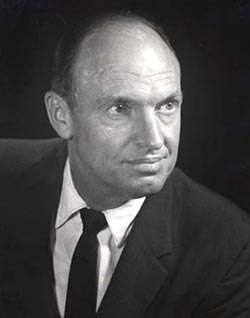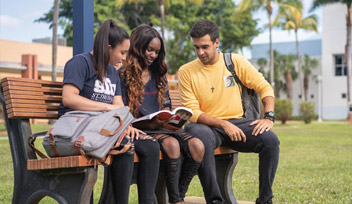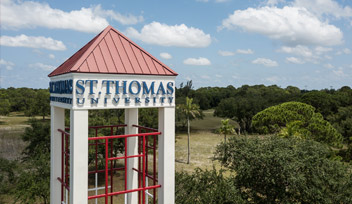Judge C. Clyde Atkins and
Saint Thomas University
December 1, 1961 – At the meeting of the Board of Trustees, C. Clyde Atkins was appointed resident agent of Biscayne College, Inc. The meeting was held at Mr. Atkins’ office at the Alfred I. duPont Building in Miami.
March 1962 – Atkins obtained the loan for Biscayne College’s first building – $500,000 from Peoples National Bank of North Miami Beach.
1963 – Member of the Biscayne College, Inc.
February 8, 1965 – First elected as member of the Board of Trustees for 3 year-term
August 23, 1965 – Signed Biscayne College Pension Plan
1970 – Received Honorary Degree – Doctor of Education – Biscayne College.
1984 – Member of School of Law Board of Advisors.
Biographical Sketch
C. Clyde Atkins (1914-1999) was known as a strong and compassionate judge of the U.S. District Court, Southern District of Florida from 1966 to 1999. During his long tenure, he served as the Chief Judge of the District from 1977 to 1982 and ruled on a number of controversial, high-profile cases, many related to enforcing civil liberties. Known by some as “Hard Luck Clyde” because he was given so many controversial cases by the luck of the draw, Judge Atkins advocated for the rights of the homeless, upheld the right of Cuban and Haitian refugees to lodge petitions in U.S. courts, and worked for the desegregation of public schools.
Atkins was born in Washington D.C. and moved from Chattanooga, TN to Miami in 1921. He graduated from Miami High School, attended the University of Miami, earned a law degree from the University of Florida, and married Esther Castillo in 1937. He practiced law in Stuart, Florida from 1936 to 1941. From 1941 to 1966, he was a partner at Walton, Lantaff, Schroeder, Atkins, Carson and Wahl in Miami In 1966, he was appointed as a judge in the US. District Court — Southern District of Florida by President Johnson.
Atkins handled difficult and high profile cases with fairness and a humanitarian philosophy. Atkins was chief judge of the District from 1977 to 1982 and earned a solid reputation for running an effective court during a difficult time in Miami — a time that was riddled with refugee problems, violence and drug smuggling.
As the District’s Senior Judge, Atkins went against both the H. W. Bush and Clinton administration’s policies to repatriate Cuban and Haitian refugees housed at Guantanamo Bay, Cuba. In 1989, he ruled on the Eastern Airlines strike, and in 1992, he ruled on his arguably most influential case involving the homeless in Miami. Atkins ordered the creation of “safe zones” for the area’s homeless to congregate without the threat of police arrest. Much of the nation’s subsequent attitude to rehabilitate the homeless through training and the creation of shelters was influenced by this decision.
Judge Atkins has been associated with St. Thomas University since its inception. At the first meeting of the Board of Trustees of Biscayne College he was appointed resident agent of the college. This meeting was held in his office in downtown Miami. In 1962 he obtained the loan for $500,000 for Biscayne College’s first building (Kennedy Hall). He served on the University’s Board of Trustees from 1965 and the Law School Board of Advisors from 1984 until his death in 1999. In 1970 he received an honorary degree from Biscayne College.
Judge Atkins died in Miami on March 11, 1999. He is survived by his wife, Esther, and daughter Julie A. Landrigan. Two children, Carla A. Schulte and Carl Clyde Atkins, were previously deceased.






